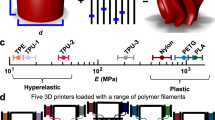Abstract
THE quantitative measurement of hair is an important factor in studies of heat exchange between animal and environment. Methods currently employed consist in counting the number of hairs per unit area, measuring the mean hair length, and determining the weight of hair per unit area. In measurements of hair number or hair weight per unit area a major error arises from the difficulty of measuring precisely an area on the mobile, elastic, non-planar skin of an animal. Any method requiring the removal of the hair for measurement changes the heat-transfer characteristics of the area, and repeat measurements cannot be made on the same area. An absorption-type beta-ray gauge would appear to offer a solution to the problem of measurement of the mass of hair per unit area. It would be a rapid, non-destructive, and reasonably accurate direct measurement of the mass of hair per unit area at the point of measurement.
This is a preview of subscription content, access via your institution
Access options
Subscribe to this journal
Receive 51 print issues and online access
$199.00 per year
only $3.90 per issue
Buy this article
- Purchase on Springer Link
- Instant access to full article PDF
Prices may be subject to local taxes which are calculated during checkout
Similar content being viewed by others
References
Blincoe, C., Nucleonics, 14, No. 8, 82 (1956).
Author information
Authors and Affiliations
Rights and permissions
About this article
Cite this article
BLINCOE, C. Beta-Gauge for Hair Measurements. Nature 178, 938–939 (1956). https://doi.org/10.1038/178938a0
Issue Date:
DOI: https://doi.org/10.1038/178938a0
Comments
By submitting a comment you agree to abide by our Terms and Community Guidelines. If you find something abusive or that does not comply with our terms or guidelines please flag it as inappropriate.



